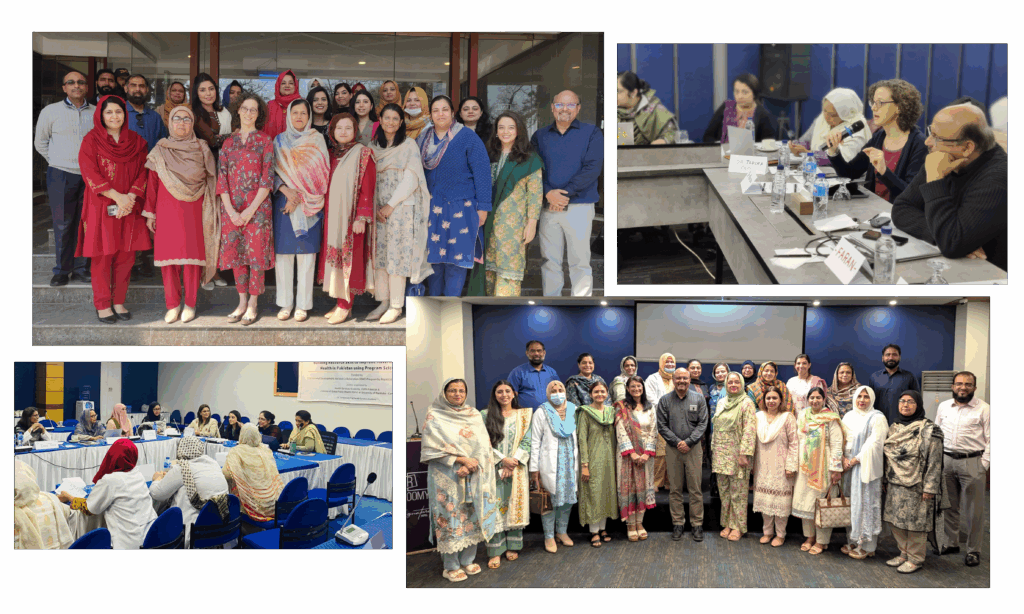Academics & Capacity Development
-
Building Research Skills to Improve Maternal/Child Health in Pakistan using Program Science approach (July 2022 to March 2026)
-
Human Resource Development Program (HRDP) (April-Dec 2013) in Punjab Pakistan

Background
This four-year project is led by the Institute for Global Public Health (IGPH) at the University of Manitoba (UM), in partnership with the Health Services Academy (HSA) and CGPH-Pakistan. RMNCH clinicians and public health providers are trained on the principles of program science, program monitoring and evaluation, fundamental statistical analysis, and knowledge translation.
Workshops are being conducted, which focus on research methods and statistical analysis and their application in program science. Participants will be assessed based on a formative assessment conducted during ongoing workshop activities. Participants in groups will identify RMNCH program challenge, define a research topic, and implement the research project using existing clinical or program data and secondary analysis. In last year of the project workshops will be held which focus on use of data for decision making and knowledge translation to ensure that knowledge generated is taken up to improve RMNCH clinical care and program implementation and ultimately, optimize population-level outcomes.
1st Year (2022)
Workshop 1: Introduction to program science
The 3-day workshop hosted by Health services academy and CGPH was held in Health services academy (HSA) from 1-3 February 2023. The workshop brought together over 35 clinical specialists and Public health professionals. The workshop successfully harnessed the enthusiasm and experience of participants and reached a wide-ranging consensus.
With the presentations and group discussions, the participants were briefed about the broad aspects of research, types of research, different research methodologies, research ethics, critical appraisal of literature, and how programs utilize research data for decision-making. Also, they were introduced to the concepts of how to develop relevant research questions, select appropriate research approaches, and methods to address them. Followed by this, they were briefed about the Program Science concept and how it follows a program life cycle- from strategic planning to implementation to program management and evaluation.
2nd Year (2023)
Workshop 2
Title: Epidemiological Research Study
The two-day workshop on epidemiological research design was successful in providing participants with a comprehensive understanding of study design, data collection, management, analysis, and interpretation. With the presentations and group discussions, the participants were briefed about the broad aspects of epidemiological research, how epidemiological investigations are designed, determinants of disease, different research methodologies, and study designs. Also, they were introduced to the concepts of how to develop relevant research questions, select appropriate research approaches, and methods to address them. The workshop provided an opportunity for participants to apply their knowledge through group work, and the Q&A session allowed participants to clarify any questions or concerns they had. Overall, the workshop was a valuable learning experience for all participants.
3rd Year
Workshop 3 (2024)
Title: Protocol development
A two-day workshop was held in Islamabad, with all our participating health facilities and mentors from the University of Manitoba. The main aim of the workshop was to finalize the essential protocol components like sample size, sampling strategy, data collection techniques, outcome variables, and operational definitions for study variables. Each team was assigned a mentor/facilitator who guided them throughout the process. The teams then presented their group work and received feedback from the mentors. The mentors will work closely with the teams in finalizing their protocols and study questionnaires for submission to their respective institutional review boards (IRBs).
4th Year (2025)
Workshop 4
Title: Orientation to Data Analysis
A one-day session was conducted on Orientation to Data Analysis for all health facility teams. It aimed to introduce clinicians to the basic concepts of data analysis, result interpretation, and understanding of statistical results. This Workshop was one of two sessions planned in the Data Analysis series. The session started with a presentation of project updates for each facility team to bring everyone up to date. Keeping their study objectives and tools in view, each facility presented its tentative analysis plan, which was followed up with feedback and discussions from the mentors. This was followed up with an interactive session on data analysis and interpretation of results. The participants gained an insight into the basic principles of data analysis and interpretation of results. They also had more clarity on their respective analysis plans.
The key results of the project were (1) Built and trained a resource group of midlevel professionals (2) Established a scientific forum consisting of Public health experts, NGO representatives, academicians, researchers and program staff
Partner: UNAIDS Pakistan & Punjab AIDS Control Programme